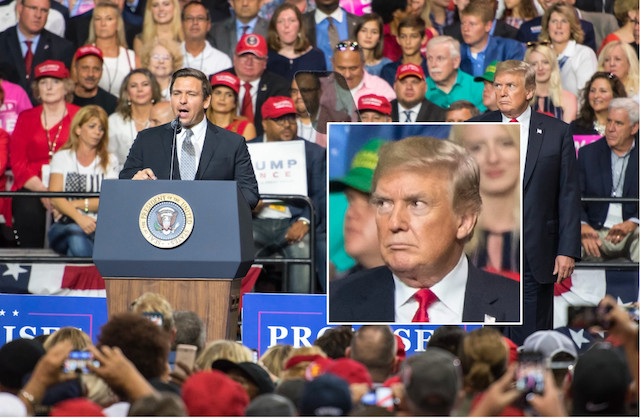Missing the Point – ‘Yikes! How is it possible that I find myself rooting for Trump to win his party’s nomination?!’
Lately, I’ve found myself hoping that Donald Trump gets the Republican nomination for President. Why is that? Because I think he’s the easiest of the Republicans to beat.
Trump is a loser. He always has been. It’s just taken most of his life for his “loser-ness” to catch up with him. Think of it as a form of The Peter Principal. According to Peter, people tend to get promoted to levels that, eventually, exceed their capabilities. In Trump’s case, he managed to lie, cheat and bully his way to the top. But then being at the top was too much for him. There will be more indictments and some convictions soon enough. Stick a fork in Donald. He’s done, cursed by his shenanigans to spend the rest of his life trying desperately to stay out of jail and reinvent history.
So, what explains his continuing popularity and standing in the polls? To answer that question, we need to go back to when he ran for President the first time, against Hillary Clinton. Except for his surprisingly successful stint on NBC’s “The Apprentice,” not many outside New York City knew who Trump was. Running for the Republican nomination gave him national exposure in front of an audience that would find his non-traditional approach to politics refreshing. Unfortunately, their understanding of who he really was fell short of realizing that he is, in fact, as dumb and dishonest as he is nuts.
Against this background of voters tired of the same old, same old politics, Trump’s campaign had three advantages… 1. New age, 24×7 media, desperate for content, that loves whatever gets people’s attention – and that gave him extraordinarily high levels of free coverage. 2. Way too many traditional, boring Republican opponents who had no idea how to handle his brash, obnoxious style. It was Trump, all alone, against everybody else who was running. His opponents split the vote of the majority of traditional Republicans, allowing him to capture the nomination with only 44.9% of the total Republican vote.
Not incidentally, the Republicans who did vote in their primaries represented, collectively, only 14.8% of total registered Republicans. Put those two percentages together and it turns out that Donald Trump was nominated by only 6.7% of total registered Republican voters. A whopping 93.3% of registered Republicans either wanted someone else or didn’t care enough about who their party nominated to vote. Now how pathetic is that? Even if 100% of the Republicans who did vote, all 14.8% of them, voted for Trump, there aren’t enough of them to constitute a “base” in any meaningful sense of the term.
So, Trump won the nomination and then the third miracle occurred. 3. As fate would have it, he ran against Hillary Clinton, a brilliant individual, but lousy candidate. And the rest is history that is still unfolding.
As for Trump’s current standing in the polls, it’s too early. Political polls tend to favor candidates that people know something about. Outside of Florida, for example, and people who watch CNN and the other news channels, DeSantis has yet to introduce himself properly to the American voter. While everybody already knows Donald Trump. That’s why DeSantis isn’t worried about his numbers. It’s way too soon for meaningful polling.
There’s a tendency for people to think that Trump is some sort of political genius who planned all this, but let’s not give him the credit he doesn’t deserve. He’s lucky, I’ll give him that, and has a certain natural skill as a carny huckster. That said, he’s been the beneficiary of several media-technological and socio-political trends that broke his way. Bad news for Donald, the clock has just about run out on his fifteen minutes of fame, figuratively speaking.
Flash forward to the 2020 election that Trump lost, leaving most Republicans, in and out of office, chasing the so-called “Trump Base.” The problem for Trump and almost every other Republican candidate of note is that the base they’re chasing doesn’t actually exist. For one thing, Trump’s following – while they may be vocal, effusive in their accolades for their leader, and unbelievably gullible – was never a majority. Not even close. From that point of view alone, they don’t constitute a “base” of anything – other than an upside-down pyramid and we know how unstable those are. Most Republicans are still what might be described as the “traditional” kind that are pro-business, financial, and social conservatives who have, as silent majorities tend to do, conceded elective politics to the more radical, nutball elements of their party.
More importantly, this base that so many candidates keep chasing has another problem. In 2016, Trump’s core following consisted of people who wanted someone fresh, a non-traditional politician they could support. They were voters who had no idea they were being played. Eight years later, people know who Trump is. Those who are still following him aren’t the core or foundation of a legitimate political party. They’re groupies, the kind that used to follow bands and excuse any aberrant rock star behavior for the chance to be part of their hysteria.
Too bad for candidates, like DeSantis in Florida, hoping to take over this following. Cult membership doesn’t change its loyalties the way undecided voters do. When Trump famously bragged that he could shoot someone in Times Square and not lose any supporters – except perhaps the one he shot – it was the groupies’ mentality of his followers that he was talking about. Otherwise, and I know this is a bold statement, he doesn’t have any base nor is there one for his opponents to take over.
Personally, I’m hedging my bets. I want the Democrats to keep The White House and retake the House. For that to happen, Biden – or some other Democrat nominee? – needs to be able to beat his or her Republican counterpart. But just in case Biden can’t win as some polls are currently indicating, the last thing we need is Trump or DeSantis taking charge of our government. DeSantis is a particularly scary alternative. Unlike Trump, he’s young, smart and, how can I put this, “not mentally ill.” What he is, however, is a champion of rightwing social programming which is long on government control and short on personal freedoms. DeSantis may be a registered Republican and fiscally conservative, to a fault, but his concept of the role of government is authoritarian and has nothing to do with the classic view of traditional small-government Republicanism.
So, my plan is simple. Let Trump and DeSantis and maybe a couple of other Republican candidates split the rightwing groupie vote and hope that a more reasonable Republican – maybe New Hampshire’s Governor John Sununu for example? – wins the nomination with a larger minority of traditional Republican support. Not incidentally, that nomination may spell the beginning of the end of the Trump following’s hold on the Republican party and, over time, on Republican-controlled state legislatures around the country. And that’s really good news.
Whoever runs in next year’s Republican primary, the smart money is on someone who excites the majority of registered “Gee whiz, is there nobody out there who will save us from these idiots?” Republicans enough to get them out to vote – even if that means upsetting most of the Trump groupies.
And now you know why I’m hoping Trump hangs in there and isn’t forced to drop out because of legal difficulties, splitting the Republican nutball vote. DeSantis will deprive Trump of the nomination and Trump will do the same for DeSantis in return. That way, even if a more reasonable, more moderate Republican nominee beats Biden, it won’t be the end of the world for American democracy as we know it.
As for Trump, he’s as stale as a three-day-old bagel that’s been hiding out in the corner of its bin. Even if he does win his party’s nomination, I think the Democrats and Independents can beat him, again. Maybe retake the House in the process. And that, finally, will be that.

Les Cohen is a long-term Marylander, having grown up in Annapolis. Professionally, he writes and edits materials for business and political clients from his base of operations in Columbia, Maryland. He has a Ph.D. in Urban and Regional Economics. Leave a comment or feel free to send him an email to [email protected].

